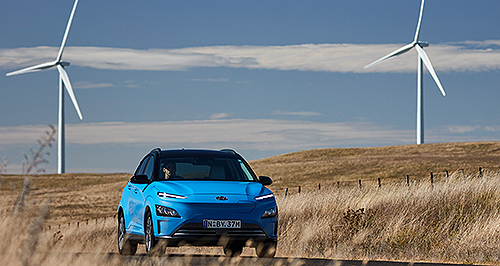News - Industry NewsMore brands commit to sustainable futureGreen: A flood of mainstream electric vehicles is coming, to carry the baton for the likes of Hyundai's Kona Electric. Car-makers increasingly aim for CO2 neutrality, Mitsubishi takes different approach16 Sep 2021 MORE and more car manufacturers are committing to a sustainable future and laying out their plans to achieve total carbon neutrality, with some of the more recent announcements coming from Mitsubishi, Nissan, Renault, Mercedes-Benz, BMW, Hyundai and Audi.
Mitsubishi outlined some of the more conservative plans among car-makers covered here, its goals centred around ploughing on with developing its plug-in hybrid (PHEV) technology.
At a global level, the triple diamond brand wants to reduce its vehicles’ CO2 emissions by 40 per cent by 2030 – compared to 2010 levels – and is aiming to reduce CO2 emissions from its ‘business activities’ by 40 per cent compared to fiscal year 2014 (by 2030).
No fixed date has been announced for Mitsubishi’s transition to fully electric vehicles (EVs), however it has locked in a 2050 deadline for being carbon neautral with at least one electrified model variant set to be offered in every major segment by 2030.
The brand’s local arm released a white paper last week entitled ‘The Road to Net Zero Emissions’ detailing its eco-friendly new head office in Adelaide and calling on the South Australia state government to include PHEVs in its newly tabled EV subsidy scheme.
According to the paper, new PHEVs sold will be exempt from the state government’s $3000 subsidy but at this stage will end up paying a bigger road usage charge than traditionally powered vehicles.
“Mitsubishi believes that PHEVs should treated fairly: if they are treated as electric vehicles for tax purposes, then they should also be treated as electric vehicles when it comes to accessing subsidies,” the paper reads.
“PHEV owners should definitely not be worse off compared to traditional combustion engine vehicles.”
Mitsubishi Motors Australia Limited (MMAL) marketing and operations director Rob Nazzari went one step further, saying the brand provides South Australians “with technology that will work for our way of life and geography – including those who drive longer distances”.
“This way, every South Australian can start their personal road to zero, whether they can afford an expensive EV or a more affordable PHEV,” he said.
“Today, we are proud that our PHEVs are an affordable and practical choice for South Australian households when compared to many EVs.
“If our customers could access them utilising a subsidy, our entry level Plug-in Hybrid EV would be within a whisker of the $41,000 average purchase price for new vehicles in Australia.”
Mr Nazzari also said the brand’s “average” PHEV customer uses EV-mode 84 per cent of the time, while a claimed 83 per cent of Outlander PHEV owners say they’ll opt for an EV as their next vehicle.
“They (PHEVs) can also help fast track the future uptake of EVs by familiarising consumers with the technology,” he said.
Both of Mitsubishi’s alliance partners, Nissan and Renault, have laid out fixed carbon neutrality deadlines and electrification goals.
Nissan is aiming to reach carbon neutrality for its “operations and the life cycle of its products by 2050”, with every all-new model offered in key markets to be electrified by the “early 2030s”.
In Europe, the Japanese brand is targeting a 75 per cent electrified sales goal by the end of 2023.
Renault, on the other hand, says it wants to be “the greenest brand in Europe” by 2030 with an electrified sales goal of 90 per cent – the current figure is at around 25 per cent.
Sticking with European brands, the BMW Group has reaffirmed its “commitment to electromobility and sustainability” by confirming more than half of the 25 new models coming before 2023 will feature an all-electric powertrain, culminating in Mini’s transition to a dedicated EV brand by 2030.
In terms of sustainability, the Bavarian group is targeting a 50 per cent reduction in global CO2 use-phase emissions compared to 2019 levels by 2030.
Meanwhile, German compatriot and arch-rival Mercedes-Benz is going straight for the jugular; it says it will be fully electric by 2030 with an interim goal of electrified vehicles making up 50 per cent of its global sales by 2025.
The 2030 cut-off for internal combustion engines (ICEs) is shared by luxury British marque Bentley, though fellow Briton Jaguar says it will complete its all-electric transition by the end of 2025.
From the year after, Audi says all its new model launches will be battery-electric, with production of its internal combustion engines to cease in 2033.
Audi’s parent company Volkswagen will undertake a similar strategy, citing 2035 as end of days for its ICE models as it marches toward its goal of total carbon neutrality by 2050.
While most of the industry champions battery-electric tech, the Hyundai Motor Group has been equally singing the praise of hydrogen fuel cell technology and recently announced its intent to provide price parity between FCEVs and BEVs.
With both forms of EV tech being rapidly developed, Hyundai has confirmed it will also stop selling ICE vehicles in Europe in 2035 on its way to being totally carbon neutral by 2045.  Read more13th of September 2021  BMW focuses on sustainability in MunichCircular economy and sustainable urban mobility headline BMW’s 2021 IAA presence9th of September 2021  Hyundai hits gas pedal with FCEV sportscar conceptHyundai previews a sporty tree-hugger with 500kW hydrogen-powered Vision FK concept8th of September 2021  Hyundai targets hydrogen FCEV price parity with EVsHyundai FCEVs to cost the same as EVS by 2030, company to be carbon neutral by 204530th of August 2021  Audi to axe ICE production in 2033New Vorsprung 2030 strategy details Audi’s plans for an EV ‘ecosystem’23rd of July 2021  Mercedes-Benz announces $A64b EV commitmentMercedes-Benz outlines new partnerships and luxury EVs for its electric future11th of May 2021  Renault merges Renault Sport with AlpineRenault Sport now comes under the Alpine Cars banner as group hunts sustainability7th of May 2021  Renault details future brand visionGreen technology, new logo, C-segment sales all priorities for Renault going forward |
Click to shareIndustry News articlesMotor industry news |
















Facebook Twitter Instagram